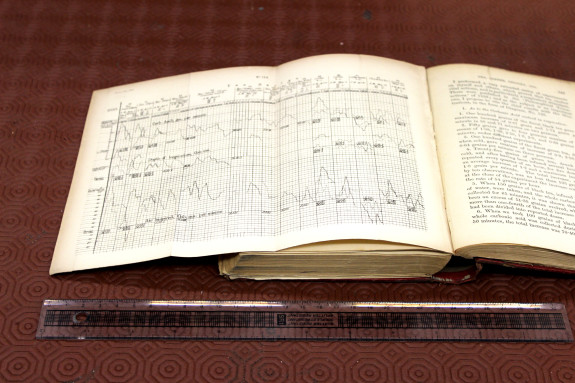We are grateful for the opportunity to cross-post content from the Wellcome Library’s blog about the UK MHL project! This post originally featured there on 5/13/2015.
The library of Royal College of Physicians (RCP) is delighted to be one of the ten UK partner organisations taking part in the UK-Medical Heritage Library (UK-MHL) project. Over next year, working with the Wellcome Library and the Internet Archive, the RCP will be sending books to be digitised and made available online for free.
The Royal College of Physicians was founded in 1518, which makes it the oldest royal medical college in England. The library was founded in the same year and grew mainly through donations and bequests. The Great Fire of London in 1666 destroyed much of the original collection, but the library survived and continued to grow through bequests and donations, as well as new purchases. Initially the collection was not limited to medical subjects, but from the 19th century it became focused on items relating to the work of physicians. The library is thriving today, offering access to contemporary resources for doctors and medical researchers and also historical items for those interested in the history of science and medicine. The RCP has many interesting and unique items which fall into the time period that the UK-MHL covers, 1780 to 1914.

I am project coordinator for the RCP and my role is very much a hands-on one. I am charged with hunting down all the books and pamphlets which are to be sent to the Internet Archive’s scan centre. Once I have located these items and gathered them altogether, I assess their suitability for digitisation. First, I check to see how tightly an item is bound. If it is too tight and the text is curling into the gutter, then unfortunately the platform on which the digitation process takes place will not be able to capture this text. This also applies to items which are larger than the platforms, so I make sure to have a ruler with me at all times checking the width of books and their gutters.
Next, I check to make sure there are no duplicate copies. If there are some duplicates, I must make a choice as to which copy will be sent for digitation. The decision can come down to condition or how tightly the item is bound. When all these things are equal I search for other distinguishing marks such as interesting annotations or a provenance which may interest readers. For example this copy of On a haematazoon inhabiting human blood : its relation to chyluria and other diseases is signed “with the author’s compliments”.
Once all the items have been checked and assessed as being suitable for digitisation, I set about packing the volumes. We use big, sturdy crates which hold about 50 items at a time. As these items are rare books I have to ensure that they are packed very carefully and securely. Layers of plastic sheeting, foam, and bubble-wrap are used to line the crate, with extra bubble-wrap used around the volumes, filling any gaps which may result to books sliding and being damaged. I must say this was the task that I was most nervous about carrying out but now, three batches later, I feel like I have mastered the UK-MHL packing technique.
One of the perks of being so hands on with the materials is that I get to take a look at all the wonderful information contained in the books and pamphlets. The RCP has a diverse collection; subject areas cover the breadth of medical and scientific enquiry, as well as topics such as heraldry, library science, linguistics, and religious texts. I am always on the look-out for interesting pictures, trivia, dedications and commentaries, and there is no shortage of these!
I particularly enjoyed looking at the books on therapeutic baths and spa trips. We have a number of these which covered healing spring resorts all over the world, and many even had helpful maps tucked away in pockets stuck to front covers. One book which stood out for me was Dress : its sanitary aspect. A paper read before the Brighton Social Union , January 30th, 1880. The book contains pictures of healthy bodies and what can happen to bodies after some styles of fashionable clothing are worn for long periods of time.
The aim of the project is to make historical resources available for researchers so that the understanding of the intersections of medicine, science and health can be enhanced. I must say that I am expanding my own knowledge on a daily basis through working with books such as The hygiene of the mouth: a guide to the prevention and control of dental diseases which detailed the types of dental treatment which were common for children in the 19th century and why.
As the project progresses we will be sharing some of the interesting items that we uncover through Twitter and the Library and Museum Blog. The books themselves will be available in their digitised formats through the Wellcome Library catalogue, the Internet Archive and, soon, JISC Historical Books. Make sure to check back regularly as books are continuously being updated. The original books will also be available for viewing in the RCP Library reading room.
Author: Alana Farrell is Project Coordinator UK-MHL, Royal College of Physicians London.













